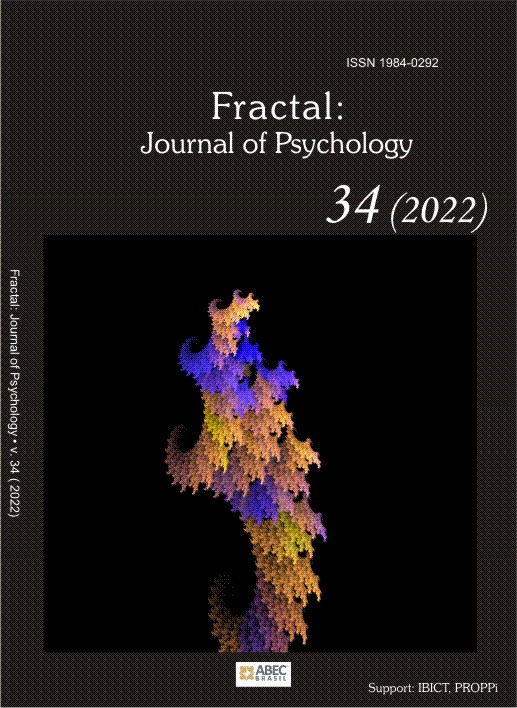Laugh-clinic interventions: between clowns and workers on permanent education in mental health
DOI:
https://doi.org/10.22409/1984-0292/2022/v34/5783Keywords:
clown, mental health, permanent education, laugh-clinicAbstract
This article is a report of the research developed by the first author in her master degree in social and institutional psychology, having as its theme the researcher’s meetings as clown and as psychologist with the workers in the spaces of permanent education practices in mental health. Such meetings take place from the interventions of the clown Dulcinóia, embodied in the researcher through the mask of the red nose, both at the permanent education practices in mental health and in the exercise of the research. These interventions were termed laugh-clinic interventions. Thus, the relationships of clown techniques with mental health from the lived experiences and possible inventions on different ways of working and caring in this context are discussed. The experiences are narrated and developed from the methodology of the essay on the lived scenes. As a conclusion, we highlight the importante of clown´s figure presence and sign of humor as producers of possible transformations and extention of the look on mental health work.
Downloads
References
ADORNO, Theodor W. O ensaio como forma. In: ______. Notas de literatura I. Tradução e apresentação de Jorge de Almeida. São Paulo: Editora 34, 2003. p. 15-45. Coleção Espírito Crítico.
AGAMBEN, Giorgio. Profanações. Tradução e apresentação de Selvino José Assmann. São Paulo: Boitempo, 2005.
ARISTÓTELES. Partes dos Animais. In: ______. Obras Completas. Tradução, introdução e notas de Maria de Fátima Sousa e Silva. Lisboa: Centro de Filosofia da Universidade de Lisboa, Imprensa Nacional-Casa da Moeda, 2010. v. 4, tomo 3.
BARBOZA, Rita Pereira. Intervenções Riso-Clínicas: entre palhaços e trabalhadores na educação permanente em saúde mental. 2016. 88 f. Dissertação (Mestrado em Psicologia Social) – Universidade Federal do Rio Grande do Sul, Porto Alegre, RS, 2016.
BENJAMIN, Walter. Magia e técnica, arte e política. 7. ed. Tradução de Sérgio Paulo Rouanet. São Paulo: Brasiliense, 1994. Obras escolhidas.
BENJAMIN, Walter. Rua de mão única. 5. ed. São Paulo: Brasiliense, 1997.
BERGSON, Henri. O Riso: ensaio sobre o significado do cômico. 2. ed. Rio de Janeiro: J. Zahar, 1983.
BURNIER, Luís Otávio. A arte de ator: da técnica à representação. Campinas, SP: Unicamp, 2001.
CASTRO, Alive Viveiros de. O elogio da bobagem: palhaços no Brasil e no mundo. Rio de Janeiro: Família Bastos Editora, 2005.
CECCIM, Ricaro Burger. Educação Permanente em Saúde: desafio ambicioso e necessário. Interface: Comunicação, Saúde, Educação, v. 9, n. 16, p. 161-177, set. 2004/fev. 2005. Disponível em: https://www.scielo.br/j/icse/a/jC4gdtHC8RPLWSW3WG8Nr5k/?lang=pt&format=pdf. Acesso em: 20 out. 2020.
CERTAU, Michel de. A invenção do cotidiano: artes de fazer. Petrópolis: Vozes, 1998.
DELEUZE, Gilles. Espinosa: filosofia prática. São Paulo: Escuta, 2002.
DORNELES, Juliana Leal. Clown, o avesso de si: uma análise do clownesco na pós-modernidade. 2003. 114 f. Dissertação (Mestrado em Psicologia Social) – Universidade Federal do Rio Grande do Sul, Porto Alegre, RS, 2003.
DORNELES, Juliana Leal. Pelo vigor do palhaço. 2009. 116 f. Tese (Doutorado) – Programa de Pós-Graduação em Psicologia Clínica, Pontifícia Universidade Católica de São Paulo, São Paulo, SP, 2009.
EISENBERG, Avner. Os princípios do palhaço. 2021. Disponível em http://www.avnertheeccentric.com/eccentric_principles_portuguese.php. Acesso em: 28 dez. 2016.
FERNANDES, Millôr. O homem do princípio ao fim. Porto Alegre, LP&M, 2008.
KASPER, Kátia Maria. Experimentar, devir, contagiar: o que pode um corpo? Pro-Posições [online], v. 20, n. 3, p. 199-213, 2009. https://doi.org/10.1590/S0103-73072009000300013
KUPERMANN, Daniel. Ousar rir: humor, criação e psicanálise. Rio de Janeiro: Civilização Brasileira, 2003.
LARROSA, Jorge. O ensaio e a escrita acadêmica. Educação & Realidade [online], v. 28, n. 2, p. 101-115, 2003.Disponível em: https://seer.ufrgs.br/index.php/educacaoerealidade/article/view/25643. Acesso em: 5 ago. 2020.
MERHY, Emerson Elias. Os CAPS e seus trabalhadores: no olho do furacão antimanicomial. Alegria e Alívio como dispositivos analisadores. 2004. Disponível em: https://docplayer.com.br/46200105-Os-caps-e-seus-trabalhadores-no-olho-do-furacao-antimanicomial-alegria-e-alivio-como-dispositivos-analisadores.html. Acesso em: 5 ago. 2016.
PINHO, Luiz Celso. Por uma existência artística: ética e estética em Nietzsche e Foucault. Griot: Revista de Filosofia, Amargosa, BA, v. 8, n. 2, p. 108-117, 2013.
RANCIERE, Jacques. A partilha do sensível: estética e política. São Paulo: EXO Experimental/Editora 34, 2005.
SILVA, Gilson Mafacioli da et al. O processo de trabalho na supervisão clínico-institucional nos Centros de Atenção Psicossocial (CAPS). Revista Latinoamericana de Psicopatologia Fundamental [online], São Paulo, v. 15, n. 2, p. 309-322, 2012. https://doi.org/10.1590/S1415-47142012000200007
GAGNEBIN, Jeanne Marie. Memória, esquecimento, transmissão: necessidade e dificuldades das narrativas ligadas à atividade do lembrar. Porto Alegre: UFRGS, 28-30 de maio de 2014. Curso oferecido pelo Programa de Pós-Graduação de Psicologia Social e Institucional da UFRGS.
WUO, Ana Elvira. A linguagem secreta do clown. Revista Integração, Ano XV, n. 56, p. 57-62, 2009. Disponível em: http://docplayer.com.br/10212104-A-linguagem-secreta-do-clown.html. Acesso em: 13 fev. 2020.
Published
How to Cite
Issue
Section
License
Copyright (c) 2022 Rita Pereira Barboza, Analice de Lima Palombini

This work is licensed under a Creative Commons Attribution 4.0 International License.
Authors publishing in this journal agree to the following terms:
- Authors retain copyright and grant the journal the right of first publication, with the work simultaneously licensed under the Creative Commons Attribution License allowing sharing of the work with acknowledgement of authorship of the work and initial publication in this journal.
- Authors are permitted to enter into additional contracts separately for non-exclusive distribution of the version of the work published in this journal (e.g., publishing in an institutional repository or as a book chapter), with acknowledgment of authorship and initial publication in this journal.

This work is licensed under a Creative Commons Attribution 4.0 International License.
To the extent possible under the law, Fractal: Journal of Psychology has waived all copyright and related rights to the Reference Lists in research articles. This work is published in: Brazil.
To the extent possible under law,Fractal: Journal of Psychology has waived all copyright and related or neighboring rights to Reference lists in research articles. This work is published from: Brazil.







